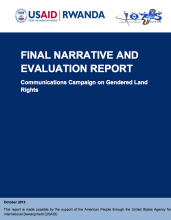Land Library Search
Through our robust search engine, you can search for any item of the over 73,000 highly curated resources in the Land Library.
If you would like to find an overview of what is possible, feel free to peruse the Search Guide.
/ library resources
Showing items 1 through 9 of 144.This report presents the results of a small scale household survey that was conducted in May
2015 to assess the extent to which rural Rwandan citizens are vulnerable or resilient to
environmental, market and land tenure risks and the level they understand the laws and rights
Residential land in Rwanda is scarce due to hilly terrain, a high population and a focus on agricultural growth to address food security concerns.
While the guarantees provided in the Katiba mark an extraordinary achievement for women’s land rights, many more steps are needed to reach gender-equitable land ownership in Tanzania.
Wildlife Management Areas (WMAs) have the potential to benefit both people and wildlife in Tanzania. But are Tanzanian communities earning enough from WMAs to want to protect the wildlife that live on their land?
Between October 2014 and October 2015, Radio Ishingiro with the support of USAID
Land Project implemented a Communications Campaign focused on influencing the
attitudes and mindsets of men and boys about gender-equal land rights to overcome
This research, entitled "The Impact of Gendered Legal Rights to Land on the Prevalence and Nature of Intra- and Inter-Household Disputes" set out to interrogate the changing landscape of gendered land rights in Rwanda, and to examine the impact of the statutory changes introduced by laws governin
Rwanda has nearly 280,000 hectares of wetlands, almost 11% of the country’s total
area.1 These wetlands provide critical habitats for wildlife and biodiversity, maintain
important hydrologic processes that help to clean and protect ground and surface
This research investigates the changing landscape of gendered land rights in Rwanda, and examines the impact of the statutory changes introduced by laws governing land, inheritance, succession and matrimonial property passed between 1999 and 2013.
Land is a critical resource. It is finite and irreplaceable. The role and efficiency of land use planning is therefore of considerable national importance. The issues faced by Rwanda in relation to land and land use planning are well recorded.









